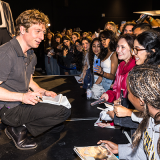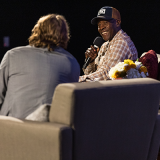Remembering Marion Knott…
November 18, 2014
It is with deep regret and sadness that I write to inform the Dodge College community of the passing of a benevolent philanthropist and dear friend of the university, Marion Knott.
Words can hardly express the difference Marion made to Dodge College. I met Marion in my first years at Chapman, when I was a naïve assistant professor. Over the years and in many ways, she taught me the essence of fund-raising: that people give to people and that what takes place is essentially an exchange of value.
If memory serves, I believe she gave me my first gift; a gift of $50K that resulted in a story that she loved to tell and I loved to hear. One weekend shortly after receiving that gift, she visited our building (Moulton Center, at that time), where I was painting the large room that housed the entire film program. She wanted to know what on earth I was doing, as she had just given me money to do whatever I needed. I told her that I could easily paint myself, but I couldn’t buy equipment without money. I wanted to use every cent of her gift for the equipment we needed. That moment, which took place when she was still a trustee working with then-President Buck Smith, cemented our relationship.
Sometime later, she helped me create our Filmmaker-in-Residence program with a $1M endowment. Our first Marion Knott Filmmaker-in-Residence in 1999 was Oscar-nominated director Arthur Hiller, who was four-time president of the Academy. That program was an essential strategy to our growth, because, at that time, nobody had heard of Chapman’s film school. Bringing prominent guests from the business to campus truly helped raise our visibility in the industry. She loved the tradition that evolved, which was at the last week of each semester, when she would join the Filmmaker-in-Residence and the scholars for lunch. Inevitably, she would go around the table and ask each student about his or her hopes and dreams. I know that she truly loved talking to them.
Flash forward two decades to another story that came from one of our numerous lunches on campus. I was in the throes of raising money for the facility we now lovingly call Marion Knott Studios. The original price of the building, $23M, had doubled because of rising construction costs, and I was having trouble getting the campaign across the finish line. We were $15M short of our goal. The university was therefore planning to open the building with no equipment, which was impossible for me to imagine. I was pretty down-hearted and not sure where to turn when I walked Marion out to her car. She said, “Bob, you look tired…really tired.” I told her how worried I was about opening with no equipment and how I saw that as a fundamental conflict with our vision of a first-rate film school with industry-standard tools.
Marion left that day without saying much, but the next morning she called me and asked if I was sitting down. When I said “yes,” she told me she was giving me $3M in cash to help us buy equipment. That gift reignited the momentum of the campaign, and in a few months our campaign chairman, Paul Folino, and I had the money in hand to open the building as it was meant to be.
I will never forget the conversation I had with her saying that we wanted to name the building for her. She said “Absolutely not!” She reiterated that she had never allowed her name on any building. But I said, “It’s not for you, it’s for us, because we want to associate ourselves with your values and your sensibility.” What I can say about her finally agreeing is that I was very gratified to hear, years later, from her son Darrel Anderson that she was very proud of having her name on the facility that was symbolic of the vision we shared. She was particularly happy with the growing reputation of the film school and the work it did with future generations of storytellers.
Over the last eight years since we opened Marion Knott Studios, I have routinely had lunch with Marion to tell her the good things that have happened at our film school. She only and always wanted to hear about “the kids,” asking “Are they getting jobs, Bob?” I was happy to be able to tell her that they were.
As I said, this has been very hard for me to write, because I can’t imagine that there won’t be one more phone call and one more lunch. But I hope that I have given you just a little idea of what kind of a difference Marion has made and how very lucky we are to have had the opportunity to associate ourselves with a woman with her values and sensibility.


